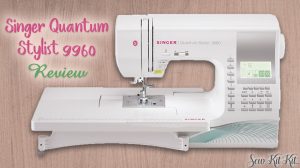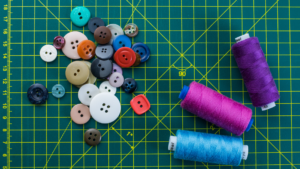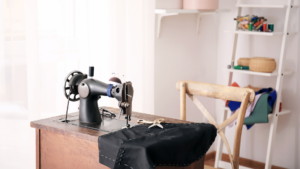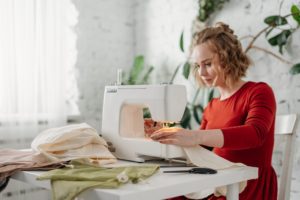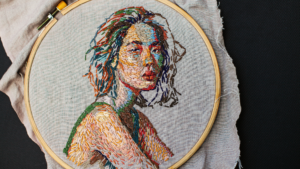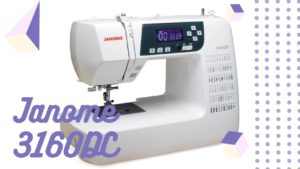Last Updated on January 10, 2023
Are you searching for a high-quality sewing machine thread for your next project? In this article we will review the best threads for a sewing machine and help you choose the one that’s right for you.
When you buy through links on our site, we may earn an affiliate commission. As an Amazon Associate I earn from qualifying purchases.
Well, your search is over! Here is a rundown of the best threads for sewing machines that can meet your different sewing needs.
A sewing thread is a special flexible ply yarn with a smaller diameter intended to stitch materials together. They are smooth and thin continuous cords spun uniformly, hard-twisted strands of yarn.
While they only represent a few parts of your sewing project, you cannot underestimate that sewing machine threads hold and fasten fabrics together. They also attach other materials to the fabric by creating a seam.
The quality of the sewing thread you will use makes the difference between poor and high-quality sewing project results. High-quality threads produce a beautiful, consistent stitch that breaks less often, leaves less lint, and holds up a lot longer.
Machine sewing also requires a particular sewing thread different from those that are used for hand sewing. But there is nothing for you to worry about, as this guide will help you select the right sewing machine threads with a list. Let’s get started.
1. Coats XP All Purpose Thread Kit
The Coats XP All Purpose Thread Kit is our choice for overall best thread for sewing machines.
- This dual duty XP S900 general purpose thread set is fabulous that combines advanced technology
- Made of polyester-wrapped core-spun material
- Provides enhanced seam appearance and makes sewing trouble free
- Available in assorted colors
- Smooth and strong thread sews perfectly on all machines from vintage to todays most advanced
- This fabulous thread combines advanced technology from coats with nearly 200 years of thread-making experience
- Product is polyester-wrapped core-spun construction creating a thread that provides enhanced seam appearance and makes sewing trouble free
- Smooth and strong it sews perfectly on all machines from vintage to todays most advanced
- Package contains fifty 1-1/2 by 1-inch spools of 125-yards of all the most popular single and multi-colors
- Thread is packaged in a reUSAble cardboard box with a velcroed flip lid featuring a clear plastic window
Coats XP all-purpose thread kit is our pick as the overall best thread for sewing machines as it provides a trouble-free sewing experience and makes professional-looking seams. Aside from machine sewing, these threads also work well for most hand sewing.
This polyester sewing thread makes it to the top of the list because it sews smoothly on all fibers, wovens, and knits. This set also comes with 50 strong and durable spools, measuring 125 yards each, and is available in popular multi and single colors.
2. Haobase Black Bonded Nylon Sewing Thread
The Haobase Black Bonded Nylon Sewing Thread is our choice for best sewing machine thread for upholstery.
- Size T70 #69 210D/3
- Color:Black
- 1500 Yard Per Spool
- Material:Nylon
- Used for the Upholstery, outdoor market, drapery, beading, luggage, purses, wallets, shoes, leather, vinyl, Canvas, Awnings, Tents and mo
Haobase Black Bonded Nylon Sewing Thread is a heavy-duty thread for sewing machines. It is nylon, ideal for heavyweight sewing fabrics like canvas, leather, and upholstery.
With its durability, flexibility, and rot resistance, this sewing machine thread is used by many sewers for interior and exterior upholstery. One spool has a whooping length of 1500 yards available in white and black shades that you can use for many of your sewing projects.
3. COATS & CLARK N574 Extra Strong Thread For Jeans
The COATS & CLARK N574 is our choice for best sewing machine thread for jeans.
- Cotton covered polyester
- Use for seams or hems on jeans and overalls
- Use a higher tension setting to obtain a balanced sti
COATS & CLARK N574 is our choice as the best sewing machine thread for jeans. It is a high-quality sewing thread that is sturdy enough to hold together thick fabrics like denim.
One spool of this golden thread has 70 yards of heavy-duty cotton-covered polyester thread. Aside from using it for bold topstitching denim, you can also use it to sew other fabrics. It is intended, specifically with strength in mind, to become one of the best-rated threads for sewing machines in the market.
4. Tandy Leather Waxed Nylon Thread
The Tandy Leather Waxed Nylon Thread is our choice for best sewing machine thread for leather.
- Package contains 25 yards
- 35 pound breaking point
- Coated with pure bees
For your leather projects, you might want to use Tandy Leather Waxed Nylon Thread, known for its pure beeswax coating. This high-quality thread for heavy-duty sewing features excellent flexibility, strength, and elasticity that works well on leather.
One spool comes with 25 yards of incredibly durable nylon thread. For your sewing needs, you can choose from a range of colors that are sold separately.
5. Gutermann Elastic Thread
Gutermann Elastic Thread is our choice for best sewing machine thread for shirring.
- 64% Polyester/36% Polyurethane. For Smocking and Shirring
- It can also be used as a tracer yarn for knitting and crochet work
- Use in a sewing machine as bobbin thread o
Gutermann offers the best stretch thread for sewing machines. It is a handy 10-meter long stretchy thread made of 64% Polyester and 36% Polyurethane.
You may choose from white, black, or red, and you can use it for knitting, shirring, doll making, and crafts. This sewing machine thread is also strong, and it won’t break when used for hand or machine sewing.
Questions and Answers
Do Sewing Machines Need Special Thread?
All-purpose polyester thread works well on most fabrics. But, when working with heavyweight or stretch fabrics, you have to utilize the same thread type as the fabric. For example, you should use an elastic thread when sewing stretch fabrics and heavy-duty jeans thread for sewing denim.
What Are the Two Categories of Sewing Threads Based on Their Sources?
Usually, sewing threads are categorized based on their sources: synthetic fiber and natural fiber sewing threads.
- Natural fiber threads – This category is made from natural products, mostly from animals and plants. It includes linen, jute, wool, cotton, silk, etc.
- Synthetic or artificially made fiber threads include nylon, polyester, rayon, and acrylic made by combining different chemicals and natural products.
The difference between the two threads is that synthetic fiber threads usually have more durability and strength than natural fiber threads. Meanwhile, natural fiber threads pierce better on fabrics than their synthetic counterparts.
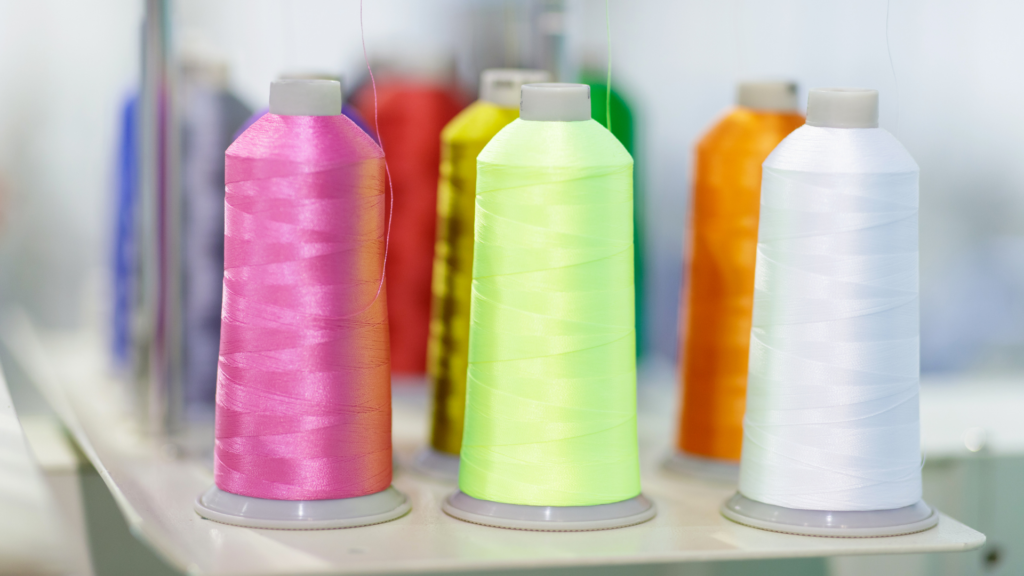
What Are the Common Types of Sewing Threads?
The common types of threads are listed below, along with their uses:
Polyester Thread
Polyester threads are among the common types of sewing threads, characterized by excellent durability and colorfast. It is also resistant to rot, heat, chemicals, mildew, and UV rays, ideal for most sewing projects.
Aside from that, it is pretty elastic and has a good recovery, preventing it from easily breaking. Since Polyester Thread can look like a natural thread, this sewing thread is easy to sew on clothes.
Among the types of polyester threads include:
- Spun polyester thread – This type of polyester thread is ideal for all-purpose sewing. It is made by dividing the fiber into four to five-inch staples then hard-twisting them into yarns. Afterward, the yarns are plied to create a more durable and smoother thread than a spun natural fiber.
- Texturized polyester thread – This thread has the characteristics of wooly nylon. The only difference is that it can endure a higher heat level.
- Trilobal filament polyester thread – is twisted multiple continuous filaments that are more resistant to bleaching and shines, similar to rayon.
Cotton Thread
This sewing machine thread is less durable and has little elasticity compared to other fiber threads. It is made out of spun staple cotton fibers and has a low sheen.
However, they produce more lint than other threads. Cotton thread works well for needlework or decorative stitching, patchwork, heirloom sewing, lightweight natural fabrics, and quilting.
Wool Thread
As its name suggests, a wool thread is suitable for heavy sewing materials like canvas and wool. But aside from that, this thread type is usually utilized for embroidery, decorative stitching, and blankets.
- Persian wool – This wool thread variant comes with three strands that can be utilized together or separately depending on the thickness of the material or the sewing project.
- Tapestry wool isn’t similar to Persian wool in thickness, and you can’t separate its strands.
- Crewel wool – This thread is made to be the thinnest of the wool thread. You can make it thicker by twisting it with more threads.
Cotton-Wrapped Polyester Thread
This sewing machine thread is used in many different sewing projects. It combines strength and elasticity from continuous polyester filaments and staple cotton filaments as an exterior wrapping.
Having these two characteristics makes the sewing thread look like cotton and work like polyester. As a result, cotton-wrapped polyester thread has more durability and heat resistance than other threads.
You can use this type of sewing thread for almost all kinds of fabrics. Also, when the material involved in your sewing project needs more ironing, this thread is ideal.
Rayon Thread
Rayon thread is another common type of sewing thread that is flexible and beautiful. However, it doesn’t have the same strength as polyester and silk.
This thread can also endure high temperatures, but it is not excellent in retaining its color. For this reason, rayon threads don’t work well for sewing. Instead, you can usually see this being utilized as an embroidery thread and for decorative stitching.
Nylon Thread
Nylon thread is commonly known for its durability, flexibility, and rot resistance. It is made out of extruded fiber, and some of its varieties are:
- Texturized thread – It is a smooth-looking continuous filament that is tough when stretched. When relaxed, this sewing thread becomes feathery, which works well for rolled hems, decorative stitches, and serged seams.
- Monofilament thread – a monofilament thread is a single filament thread available in different weights. For invisible sewing and blind hems, light monofilament threads are ideal. Meanwhile, you can use the heavier variety in a rolled stitch to support ruffled or fluted edges.
- Upholstery thread – This type of nylon thread is incredibly durable and has good sewability. However, it is only available in limited colors, ends unwind, and isn’t easy to knot.
Silk Thread
It is a type of sewing thread made from natural continuous fiber. It is famous for being durable and having a lustrous sheen.
Also, silk threads are pretty stretchy and work well on thin, delicate fabrics such as lightweight silk. You can use them for stitching, hand-sewing, and dressmaking too! Heavy silk thread, on the other hand, is commonly used for topstitching and buttonholes.
Metallic Thread
This type of sewing thread is used for goldwork embroidery, needlework, and decorative stitching. It looks like a foil and should be used with extra care as it scatters. Metallic thread comes in copper, gold, and silver color.
Bobbin Thread
This smooth, lightweight, and thin thread is the right thread for machine embroidery, machine basting, sewing fine materials, and hemming. While having a thin size, it is as strong as normal sewing threads.
Bobbin thread is available in polyester, cotton, and cotton-wrapped polyester. It also has a limited color range.
Elastic Thread
Elastic threads feature a continuous elastic core. Generally, this thread is utilized in decorating, stitching and shirring.
To use this thread, you have to hand-wind it onto your bobbin. Then, load the bobbin into its casing and place normal thread onto your sewing machine.
This elastic sewing machine thread will gather up the fabric you sew. Your project will also become elastic.
Light-sensitive Thread
Light-sensitive threads change in color depending on the lighting condition and sometimes glow in the dark. These innovative sewing threads are usually seen on topstitching and embroidery projects.
Fusible Thread
As its name indicates, fusible threads melt and blend with the fabric when ironed. You can use it in the bobbin to sketch out appliqués, pockets, etc., and on the lower looper.
Is Polyester or Cotton Thread Better for Sewing Machines?
Compared to polyester thread, cotton thread is stronger and a lot softer. With these characteristics, cotton threads are best to use for visible seams. They are also ideal for quilting as they won’t lose their shape due to their lack of stretch.
Can You Use Thick Thread in Sewing Machine?
There will be no problem if the thick thread fits through the sewing machine’s throat plate. However, avoid yarns and threads that are too coarse and nubby, such as bouclé yarns.
You should also altogether avoid using grosgrain ribbons when machine sewing as they don’t have enough flexibility. On the other hand, the thickest thread you can use in a sewing machine is V-69, and more than that size makes your stitching obvious.






